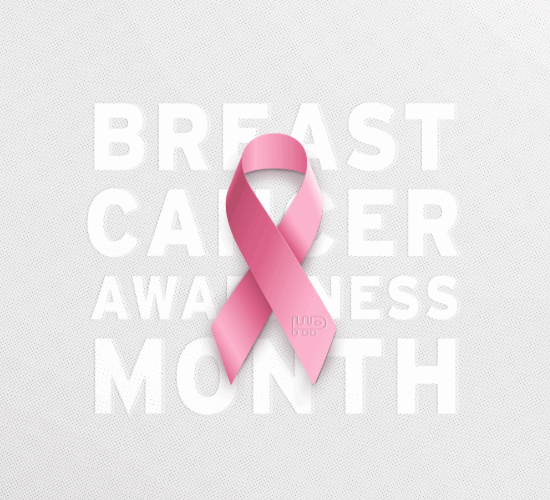October represents Breast Cancer Awareness Month – a month dedicated to coming together to support patients and survivors, honor those lost and raise money for research. Pink ribbons bring awareness and individuals and families navigating the challenges of a breast cancer diagnosis take comfort in connection. Comfort can take many forms, from small thoughtful gifts to local support and services for care, information and overall community.
Why Comfort Matters on the Breast Cancer Journey
A breast cancer diagnosis means both an emotional and physical experience for the patient and impacts every aspect of life. From surgery to chemotherapy to radiation, treatments can be physically draining. Even after treatment is completed, the emotional toll can still linger. So comfort plays an essential role. And for many, small acts of comfort can become some of the most meaningful gestures during times of treatment as well as recovery. Comfort can mean many things, including:
- Physical relief — Soft blankets, specialized pillows, and recovery garments can make healing easier.
- Emotional support — Encouraging words, companionship, and community provide strength.
- Peace of mind — Access to trusted resources reduces uncertainty and fosters hope.
The Meaning Behind Breast Cancer Awareness Month
Breast Cancer Awareness Month started in 1985 as a means to promote women getting an annual mammograph for early detection. However over the years this initiative has evolved into a global movement to educate, support research initiatives, patient care and advocacy. And while pink ribbons are a visible reminder, the heart of this month lies in action such as:
- Encouraging regular screenings and self-exams.
- Supporting organizations that fund research and provide patient resources.
- Bringing communities together to remind those affected that they are not alone.
Compassion at this time in the journey is as important as awareness, so October brings an opportunity to reflect on ways we can those that are facing this life challenge.
Ways to Provide Comfort and Support to Loved Ones
Many wonder how they can best support their family members or loved ones that have received a breast cancer diagnosis. Support doesn’t require grand or large gestures, but rather simple ways to show you care. The small things can make the biggest impact.
1. Practical Help
Appointments and treatment schedules can be very overwhelming for those undergoing breast cancer treatments. Offering rides, preparing meals and running errands is an amazing way to show ongoing support and ease the day-to-day burdens faced.
2. Thoughtful Comfort Items
Cozy blankets like The Lola Blanket, socks and care packages (such as those with lotions, teas and other comfort items) help to provide both physical relief and emotional support. These care items show that the patient is being thought of and help to brighten up the day. There are many local and national organizations that take donations and offer curated comfort kits to those undergoing breast cancer treatment.
3. Emotional Connection
Listening can be a very powerful gift. Some people do not have anyone to talk to. Regularly checking-in and sitting quietly with loved ones can provide that comfort that is being sought after that words alone can not do.
4. Encourage Rest and Healing
Reminding loved ones that it is okay to rest and receive the help they are offered without feeling a sense of guilt is essential. Creating space for recovery is comfort in itself.
5. Celebrate Milestones
Celebrating milestones in the journey and recognizing progress can provide a large amount of comfort. Whether its completing a round of treatment or even getting through a tough day, celebrations can build resilience and bring about moments of joy in a difficult time.
Local and National Breast Cancer Resources for Comfort and Support
The journey can be overwhelming, but there are countless breast cancer resources that are available to provide education and guidance, financial support, and a sense of community. Linking patients and families to trusted organizations means that they are not alone in the fight.
National Resources
- National Breast Cancer Foundation: Education, early detection programs, and patient support.
- Living Beyond Breast Cancer: Resources, peer connections, and survivor stories.
- CancerCare: Free counseling, financial support, and support groups.
- American Cancer Society: Nationwide programs with state-specific resources.
- Breast Cancer Research Foundation: Research and advocacy for better treatments and cures.
Local Scottsdale & Arizona Resources
- Bosom Buddies of Arizona: Local support groups and educational programs.
- Cancer Support Community Arizona: Free emotional, educational, and social support.
- HonorHealth Cancer Support Groups: Programs throughout Scottsdale and Phoenix.
- Phoenix Cancer Support Network: Scottsdale-based community network providing direct patient and family assistance.
- Check for a Lump: Free mammograms, wigs, and education programs for Arizona residents.
These national and local organizations offer tangible ways that breast cancer patients and their families can find both support and comfort in their own community.
Spread Comfort and Raise Awareness
Breast Cancer Awareness Month is a reminder that support is more than just raising awareness. It’s about the donations, the volunteering, and the overall sense of community and reaching out to support someone in need. Each action contributes to a greater good and helps to provide comfort to those fighting and builds a network of comfort that extends far beyond the month of October.
Take Part in Providing Comfort and Support
October is a month to honor hope, resilience and the power of community coming together in support. By focusing on ways to comfort, we support those in treatment and demonstrate the compassion needed for those undergoing this tough journey. This October, take part in something bigger. Provide some comfort, raise awareness for a cause that impacts the lives of so many, and stand together with our team at HardPart Media in the fight against breast cancer.

